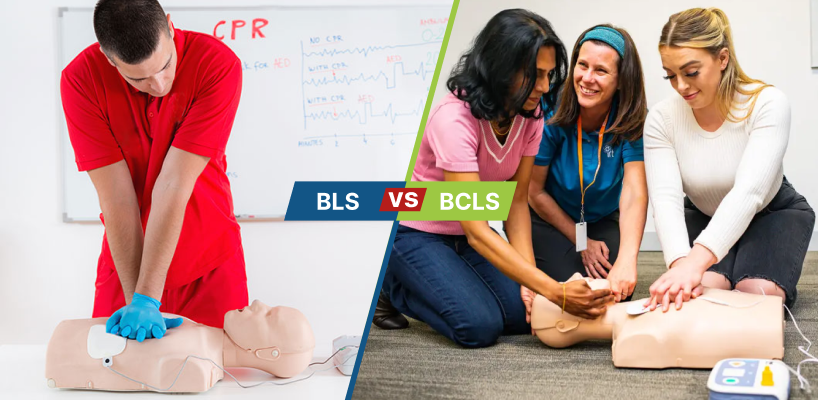
Last Updated On: septiembre 9, 2024
Anyone particularly interested in emergency medicine has at least once debated the topic of BCLS vs BLS. These two acronyms are quite common, but are even confused by seasoned practitioners.
BLS or Basic Life Support equips individuals with the lifesaving skills of cardiopulmonary resuscitation and basic AED usage. BCLS or Basic Cardiopulmonary Life Support on the other hand can be used interchangeably but is mostly required in heart related emergencies. In this blog, we will discuss the specifics of BLS vs BCLS and by the end you will have a clear understanding of both these certifications. So let’s begin!
While BLS and BCLS are often used interchangeably, it is important to understand the differences. This clarity will help you choose the right course, based on your needs and expertise. Let’s go through the points of distinction-
| Basic Life Support (BLS) | Basic Cardiopulmonary Life Support (BCLS) |
| Covers a broad range of emergency scenarios including CPR, AED use, and managing airway obstructions for all age groups. | Focuses more on cardiac-specific emergencies and the initial management of heart-related incidents. |
| Designed for a wide range of healthcare professionals and non-medical professionals. | Helpful for healthcare professionals working in environments with a higher incidence of cardiac emergencies, such as cardiac units or emergency departments. |
| It is a general certification for several emergency medical situations. | BCLS is more specialized with a greater emphasis on cardiac care. |
| Commonly used and recognized term for basic emergency life-saving skills. | Used interchangeably with BLS but implies a specific focus on basic cardiopulmonary life support. |
| Comprehensive training that includes respiratory and cardiac arrest, as well as AED usage. | May include similar content but with an additional focus on cardiovascular emergencies and treatments. |
Choosing between BLS and BCLS certification is a crucial decision for individuals who wish to establish a career in this field. Both of these certifications offer invaluable and effective training. But to understand which course is right, you will need to go through several factors. So let’s explore these factors one at a time-
Professional Environment
Job Responsibilities
Career Goals
Training Preferences
Employer Requirements
Obtaining any one of these two certifications can help you kick start your career in the field of emergency response. Let’s explore the advantages of having a BLS or BCLS certification.
The comparison between BCLS vs BLS highlights the importance of specialized training in emergency medicine. While both of these certifications teach lifesaving skills, they differ in focus and application. BLS has a more wider approach, while BCLS majorly focuses on cardiac related emergencies. Regardless of the course chosen, both BLS and BCLS greatly improve patient outcomes by encouraging a safer and prepared community. So sign up for a course of your choice and be capable of delivering high-quality care.
Read More: What Does BLS Stand For?